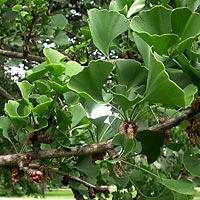

|
| Ginkgo Biloba |

Ginkgo biloba – is the tree that has been here 180 million years ago. It did not manage to reveal all the secrets of the effects on a human health. It contains such active substances that cannot be found in any other plant on this planet.
It is considered as a holy tree in the whole Asia. It belongs to the family ginkgoaceae, which forms a sort of transition between coniferous and deciduous trees. It is a direct descendant of pteridophytes and they have already occurred on our planet in Mesozoic era. It is reportedly the last living fossils and it grows normally thirty-five meter height. It has a grey crust and typical fronds. It is planted around Buddhist temples.
For medicinal purposes are most commonly used nuts and leaves:
Nuts contain:
- starches proteins and amino acids ( for example trypthophan that is important for sleep and good mood
- in a dry state the nuts contain big amount of vitamin C and vitamins of B3 ( they influence metabolism and good skin condition) and vitamin B ( it positively influences the nervous system and the proper functioning of the muscles of the whole body)
- minerals, potassium, copper and iron
- seeds contain substances destroying bacteria and mold – ginnol and ginkgol acid
Leaves mainly contain:
- flavonoids and terpenoids, organic acids but also the substances that positively influence performance of the brain, skin diseases or allergies. It is certain that the complex of these substances , that are technically called “ ginkgolides” is not contained in any other plant.
- the basic effect of the extract from the leaves is the expansion of capillaries in the peripheral vasculature and improving the flow properties of a blood ( vasodilatation) and also the antioxidant effects
Main treatment effects:
- it relieves symptoms of old age
- it accelerates wound healing
- it prevents clots ( the most important and the most significant healing ability of ginkgo is the vasodilation , it helps to maintain their good throughput , thus preventing clogging of arteries thrombosis which can lead up to infarction or to the stroke)
- it suppresses allergic reactions and respiratory problems
- it supports blood oxygenation
- it stabilizes blood glucose
- it improves memory and concentration ( substances contained in ginkgo help with reduction of the blood pressure, they improve blood supply to the brain and they increase oxygen utilization of memory cells) . The improving of oxygen utilization is happening in brain tissue through memory cells , resulting in a increasing of the concentration and overall mental freshness – students remember better the curriculum, the managers manage to do multiple activities at once and they are more competitive , the elderly retreats forgetfulness, the states of confusion and depressions. The effect of ginkgo biloba in the brain is similar to the effect caffeine from the coffee with one significant difference – ginkgo is, thanks to its antioxidant properties, able to catch exhaust fumes cells ( so called free radicals) which cause their premature wear and aging. Therefore the effect is significantly longer , more permanent, but in contrast with caffeine, there are no following states of exhausting.
- It has effect on hearing disorders from hearing loss after very annoying buzzing in the ears or tinnitus and on the sight.
- it eliminates fatigue
- it helps with psychic problems ( ginkgo ensures also the right performing of neurotransmitters – dopamine, choline, noradrenaline which cause psychic problems when malfunctioning. Mostly the anxiety, depression, or distortion of the right brain activity. Ginkgo together with ginger significantly damps feelings of the fear and anxiety.)
- it improves blood flow to the extremities. Last but not least, its effects used to improve blood flow to the extremities and to absorbing the syndrome called “ cold arms and legs , and also among people suffering from foot pain when walking, it is successfully used in the treatment of dizziness, further in a treatment of poorly healing skin defects. Simply put, Ginkgo biloba is in its place wherever the delayed or impaired blood flow causes a deterioration of organ function
- it is good for skin and hair
- it can have an effect on impotence too
- it helps with dizziness and disorders of motor function
- it relieves headache and psychogenic vascular headaches
|
|


 SHOPPING CART
SHOPPING CART


